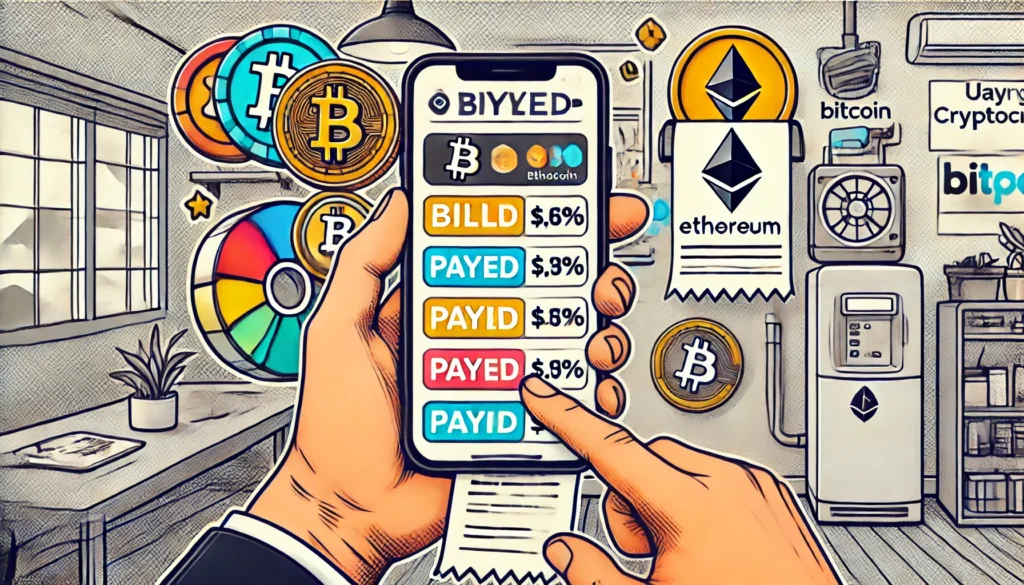Pay Bills with Cryptocurrency Easily from Your Crypto Wallet

Why Pay Bills with Cryptocurrency?
Paying bills with cryptocurrency offers a range of benefits that traditional payment systems may not always provide. Here are a few compelling reasons why more people are embracing this new mode of payment:
- Convenience: You can transact from the comfort of your home using your crypto wallet, eliminating the need for physical cash or card transactions.
- Speed: Transactions are processed almost instantly on blockchain networks, reducing the waiting time associated with bank transfers.
- Low Fees: Many cryptocurrency payment systems offer low transaction fees compared to traditional banking services, especially for international payments.
- Privacy: Cryptocurrency payments ensure a level of anonymity and security that is hard to achieve with fiat-based transactions.
- Decentralization: Paying bills via digital currencies eliminates the need for intermediaries like banks.
Steps to Pay Bills with Your Crypto Wallet
Paying bills with cryptocurrency has never been easier. Here’s a step-by-step guide to help you get started:
1. Choose a Reliable Crypto Wallet
First and foremost, you need a secure crypto wallet. There are various types available, ranging from software wallets on your phone or computer to hardware wallets like Ledger or Trezor. Select a wallet that meets your needs while prioritizing security features.
2. Ensure Sufficient Funds
Before paying bills, make sure your wallet has enough cryptocurrency to cover the bill amount and transaction fees. Some wallets allow you to check the current exchange rates so you know the exact amount needed.
3. Find Payment Services or Merchants That Accept Cryptocurrency
To pay bills with cryptocurrency, you’ll need to use service providers that support crypto payments. Popular platforms like Cointelegraph regularly publish updates on merchants and utilities accepting crypto. You can also check out dedicated crypto bill payment services tailored to your region.
4. Follow Specific Payment Procedures
Each payment merchant has its own steps for processing cryptocurrency transactions. Generally, the process involves:
- Scanning a QR code to initiate payment.
- Submitting the required cryptocurrency amount.
- Confirming the transaction in your wallet.
5. Save Transaction Details
After a successful payment, keep the transaction details for reference. Most wallets generate a unique transaction ID that can be used as proof of payment if needed.
Is It Safe to Pay Bills with Cryptocurrency?
Safety is a primary concern for anyone new to using cryptocurrency for payments. Fortunately, with proper precautions, it is highly secure to pay bills with your crypto wallet.
Here are some tips to ensure your security:
- Use a Trusted Wallet: Always rely on reputed and secure cryptocurrency wallets.
- Double-Check the Recipient Address: Blockchain transactions are irreversible. Make sure the wallet address you are paying to is correct.
- Protect Your Keys: Keep your wallet’s private keys secure and never share them.
- Beware of Scams: Verify the credibility of service providers and merchants before making any payment. Check reviews or use widely recognized payment platforms.
Who Accepts Cryptocurrency as Payment?
An increasing number of companies and service providers are embracing cryptocurrency payments. From streaming services and e-commerce platforms to utility providers and educational institutions, here’s where you can potentially pay with crypto:
- Utility Providers: Certain regional power, gas, and water companies now support crypto payments.
- Subscription Services: Platforms like Netflix or Spotify may accept cryptocurrency indirectly through intermediaries.
- Retailers: Big names like Overstock and Newegg accept crypto payments for products.
- Educational Institutes: Some universities and online learning platforms accept tuition in digital currencies.
- Rent Payments: Services like rental agencies are gradually adopting crypto payment systems.
Advantages and Disadvantages of Paying Bills with Cryptocurrency
Advantages
- Instant, borderless transactions.
- No banking hours—transact anytime, anywhere.
- Reduced dependency on fiat currencies.
- Enhanced privacy and security.
Disadvantages
- Crypto price volatility can affect transaction values.
- Adoption is still limited in some areas.
- Irreversible payments—errors can result in loss of funds.
- A learning curve for new users unfamiliar with crypto wallets.
The Future of Paying Bills with Cryptocurrency
The increasing integration of blockchain technology into everyday financial systems is making the future of paying bills with crypto incredibly promising. Governments, financial institutions, and tech giants are taking steps toward mainstream acceptance, which will likely lead to more widespread adoption of this payment method.
If you’re looking to explore cryptocurrency further or stay updated on the latest trends, visit MetaCandle for in-depth guides and news about digital currencies and blockchain technology.
Final Thoughts
Paying bills with cryptocurrency directly from your crypto wallet is an efficient, fast, and secure way to manage your finances. As more merchants and service providers accept digital payments, cryptocurrencies are playing an increasingly significant role in our daily lives. While there are challenges, the benefits it offers are hard to overlook. Ready to embrace the future of payments? Start by setting up a secure crypto wallet today!
“`







Responses